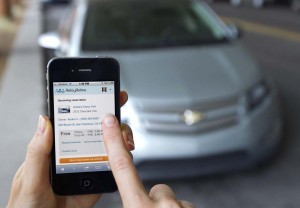
Motorists want their cars to deliver the sort of connected technologies they already have in homes, offices and on smartphones.
Automakers who want to connect with their customers have to make sure they offer the latest in connected car technology, according to a new study.
Buyers don’t want to differentiate between what technology they can access behind the wheel from what they already have in their homes, offices – or on their smartphones, according to a report by consulting firm Capgemini.
That extends to the buying process, the study of 8,000 consumers from eight countries revealed. Buyers are more and more focused on the web when it comes to gathering information on the vehicles they’re likely to buy. And dealers and manufacturers who don’t embrace that – and respond quickly to online shoppers – will likely lose sales.
“Especially for young buyers, this is what pulls them in,” Michael Boruszok, vice president of Capgemini’s automotive practice, tells TheDetroitBureau.com.
But he also warns that carmakers might be misunderstanding what motorists want. Don’t expect them to start shelling out monthly fees for the latest in-car infotainment services, the Capgemini survey reveals. They already have a lot of those features and services on their smartphones and don’t want to pay again to have it built into the car.
In fact, many buyers say they would rather skip costly options like in-car navigation since they can buy a smartphone navi app for a fraction of the price, says Boruszok. An alternate approach is to pair the car with smartphone services – as Chevrolet recently began doing with its new Sonic subcompact. Motorists can buy a smartphone navigation app for about $50 and have it display on the car’s in-dash touchscreen.
The Internet is quite literally a two-way street for car shoppers and it’s critical that automakers understand that. The survey found 94% of potential buyers go online first, sharply narrowing down their choices before they ever go into a showroom. And a sizable share only visit dealers after first connecting with those retailers online.
“The buying cycle continues to shrink and it gets more punitive, as well,” says Boruszok, explaining that if shoppers try to make a connection online “and if they don’t get a fast response from a dealer they will go somewhere else. They will defect from the dealer or the brand, or both.”
How fast is fast enough? While many dealers might think a day or two is a quick response, the Capgemini study suggests it should be more like an hour or two to ensure a sale.
The broad-reaching Capgemini study also looked at automotive market trends such as hybrids and electric vehicles and found that interest in alternative propulsion is rising fast, from 15% of those surveyed in 2011 to a full 22% in the most recent study. The level of interest varies from market to market, however, with Chinese motorists especially interested in full battery-electric vehicles, perhaps reflecting on that country’s endemic smog problems.
Surprisingly, even while interest in battery-based vehicles has risen, so has skepticism about the technology.
“A few years ago,” cautions Boruszok, “consumers were more optimistic about electric vehicles becoming viable technology” over a 5-year period. There is now growing concern about the limits of battery power, such as range, cost and charging times.
One of the findings from the Capgemini study could prove particularly worrisome for automakers hoping to continue growing worldwide sales. In many major cities, survey respondents said “They may be deferring a car purchase,” a trend showing up in other studies, especially among Millennials. The situation, says the analyst “is magnified in urban areas,” especially in Europe and even some parts of generally car-crazy China.
On the other hand, Boruszok says this trend “may be a threat – or an opportunity.” He points to carsharing programs like Zipcar as an alternative source of business.
Amy Marentec, a senior marketing executive at Ford, tells TheDetroitBureau.com she agrees. Ford has been an active partner with Zipcar and, says Marentec, “We find that when buyers rent one of our vehicles their opinion of Ford goes up.” Eventually, the maker hopes, that will translate into a sale when a consumer does decided it’s time to buy a vehicle.
